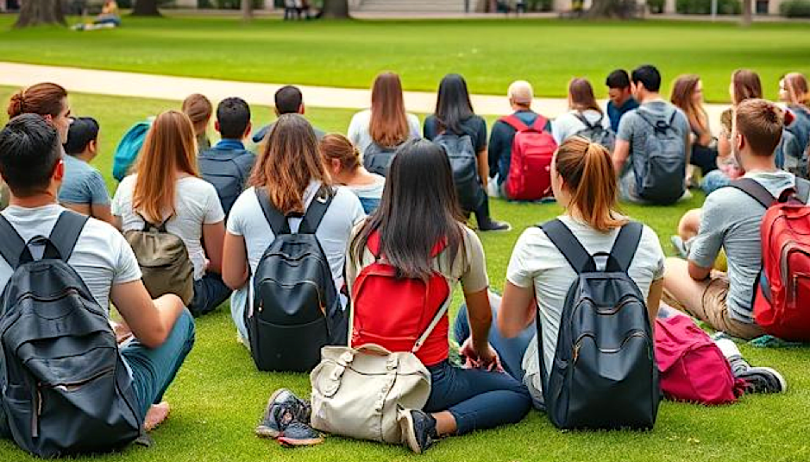Istanbul’s allure, with its mix of ancient history and modern vibrancy, has drawn students from all over the globe. The universities promise world-class education, cultural exchange, and an unforgettable experience. But for many international students, the reality of studying in Istanbul is a lot more complicated than the welcoming image presented in glossy brochures. While the welcome is loud and clear, the integration often feels more like an afterthought.
Whether you’re studying at Bilgi University, Sabanci University, Kadir Has University, or any of the many other institutions in the city, the story remains largely the same for international students. There is a noticeable disconnect between the idealized perception of Istanbul as a multicultural city and the actual experience of manoeuvring through a complex system that often seems tailored exclusively for locals.
As the world becomes more interconnected, and as Turkiye’s quota limit for international students was significantly increased, the number of international students enrolling in Turkish universities skyrocketed. Bilgi is no exception. But despite its emphasis on inclusivity and global outreach, students from abroad often find themselves feeling like outsiders in a system that seems to be designed in a way that isolates them further.
A Welcome that’s conditional
“Everyone says we’re welcome here,” says Dania, a 24 year old student from Jordan, soon to graduate from Bilgi. “But the truth is, they make no effort to make you feel like you belong. Instead it almost feels like theyre trying to push you out on purpose.” Dania’s experience is echoed by many international students across Istanbul. From subtle microaggressions to bureaucratic hurdles, the challenges of being an outsider can leave students feeling disconnected from the broader campus communities. Many graduated students recalled their time in Turkiye as being prominently marked by systemic obstacles that make integration into the Turkish culture and student life harder than anticipated.
For many, this feeling of being “not really welcome” is not the result of open hostility but a subtle undercurrent of indifference. While Turkish students are often polite when spoken to, its almost impossible to hold a conversation with them, let alone trying to make a genuine connection.
Social gatherings, group projects, and extracurricular activities often feel reserved for or catering to local students or those from Europe (erasmus groups) only, with the remaining international students feeling like they have to work twice as hard to prove themselves because they’re already at the bottom of the barrel.
Why the divide between EU students vs other international (Non-EU) students?
The passport privilege. Within Istanbul’s international student scene, there’s a silent hierarchy, and it often starts with your passport. Students from European countries tend to experience smoother integration and better treatment compared to their peers from the Middle East, Africa, or South Asia. This divide isn’t always intentional, but it reveals deeper perceptions and biases at play.
“I’m from Germany, the Turks seem to love the Almans, and perhaps our wallets too,” says Edgar laughingly, an Erasmus student at Sabanci University. “People are curious, welcoming, and want to practice their language skills, they’re very eager to hear what my life has been like. The locals i’ve met are great, however, i do get quite frustrated when shopkeepers suddenly hike up prices as soon as they realize im not a local.”
Compare that with the experience of Nouria, a student from Palestine: “When I say where I’m from, the reaction is either pity or disinterest. No one assumes i’m here because im trying to carve out a life for myself, to educate and equip myself, they just assume im escaping my country’s troubles, trying to seek refuge in Turkiye, they assume im here because i had nowhere better to be. It’s frustrating because they never bother to learn about you. They just put you in a box.”
This divide often stems from assumptions around class, culture, or even desirability. European students are sometimes perceived as “cooler,” more modern, or more aligned with Western ideals- which in turn translates to more social opportunities, more interest from the locals, and a greater sense of belonging.
Meanwhile, students from non-Western countries may be lumped together into generalized categories, stereotyped, or often simply overlooked. Though the Turkish students may be well-meaning, such stereotyping is massively alienating. Their assumptions aren’t always overt, but they build an invisible barrier that prevents genuine intercultural exchange from happening. Its the same with professors too.
“I’ve seen professors be visibly more excited about EU exchange students,” says Laila, a student from Syria. “They assume those students are more capable, more articulate, more worth investing in. We, on the other hand, aren’t even acknowledged- or sometimes acknowledged in such a racist way that it makes you want to crawl back into your mothers womb, you begin to regret your own existence.”
The imbalance also shows up in group projects, friend circles, and campus events. Many non-EU students describe feeling left out of both the Turkish student groups and the Erasmus/EU student communities, some find solace in their own off-campus cultural groups while those who are unable to integrate into those tend to take the solo route.
“I wanted to interact with everyone when i first arrived here, i tried really hard to socialise with different groups in the first year, but i didn’t quite find a place in any of those groups, as a result i lost my chance to join the Pakistani student circles aswell because they’d already settled into their own groups by the time i got around to them,” says Ahmed, a 23 year old student at Bilgi University. “Na yahaan ka raha, na wahaan ka”, meaning, “I neither belonged here, nor there, so i’ve just accepted that this is how life may be for a while, on my own.”
This division is rarely discussed openly, but it’s deeply felt. It raises urgent questions: What does it mean to be “international” in a city that markets itself as globally connected? And why are some passports treated like invitations while others feel like warnings?
The impact on mental well-being
Behind the instagram stories of Bosphorus sunsets and shenanigans, many international students are also battling a much deeper struggle: mental health challenges brought on by isolation, culture shock, academic pressure, and the constant uncertainty about their future.
For some, the initial excitement of moving to a new country fades quickly into loneliness. “You arrive thinking it’ll be this life changing adventure,” says Javed, a student from India. “But you start to feel like you’re always on the outside looking in. And that can get really heavy.”
The lack of emotional support, language barriers in accessing therapy, and a general stigma around mental health only make it harder.
“I tried to find a therapist who spoke English, but the cost was crazy. And the university counseling service didn’t really understand what I was going through as a foreigner,” explains Zahra, a student from Morocco.
On top of this, the pressure to perform academically while also navigating a foreign culture, immigration paperwork, financial stress, and future job insecurity, can feel awfully overwhelming. Many international students admit to experiencing burnout, anxiety, and even depressive episodes, often in silence.
“I felt like I couldn’t even tell my family back home, because they were proud of me,” says Ana, a Nigerian student studying in Istanbul. “But I was so mentally exhausted, I didn’t even want to leave my room most days. Im just waiting to graduate and go back home.”
Sadly, while the universities in Istanbul promote diversity, few offer mental health resources that are culturally sensitive, multilingual, or tailored to the international student experience. A 2023 study by Research Square focused on first-year international students in Turkey revealed that although perceived social support enhances mental well-being, significant institutional and cultural barriers impede help-seeking behaviors. The findings highlight the necessity for culturally competent counseling and easily accessible mental health resources within universities.
As an alternative, students try to lean on their own communities- whatsapp groups, late night kitchen conversations with flatmates, or just long-distance calls home for the emotional support they need to survive the semester. Because while the academic challenges are real, the emotional weight of not quite belonging may be the hardest part of all.
According to a 2023 study by the Turkish Psychological Association, over 60% of international students in Turkey reported symptoms of anxiety or depression, with the most common triggers being cultural isolation, visa stress, and academic pressure.
“I started feeling like I had no right to complain, im living the dream afterall,” Ahmed admits. “But when your identity feels like an obstacle everywhere you go, it takes a toll.”
The international student offices promise to support newcomers. But despite the emphasis on inclusion, many foreign students complain to feeling excluded- whether in social circles, in terms of career opportunities, or academic spaces.
The bureaucratic struggle
Perhaps the biggest obstacle international students face in Istanbul is navigating the bureaucratic maze that controls their lives. From visa requirements to denklik processes and the ikamet applications, the paperwork is an endless nightmare, that too in a language you dont understand. The universities often offer no help apart from a basic “how to apply” manual. Anything further and they’ll say its out of their jurisdiction. Many students expressed to feeling as if their respective university’s international offices simply weren’t equipped enough or familiarised enough with the struggles that international students face in the local offices/government institutions, the racism, the language barrier, the intolerance towards their questions, confusions or difficulties and the contradictory and constantly changing demands put forward by the directorate.
“Every time you think you’ve got it figured out, they change the rules, and you’re left scrambling again,” says Javed.
The difficulty of obtaining work permits also means that many students, even those with strong qualifications, find it challenging to secure internships or part time jobs- critical experiences that contribute to a student’s future career.
“I’ve applied to several internships in Istanbul, but most places don’t even consider foreign students,” says Camille, an undergraduate student from Italy at Kadir Has University. “The language barrier is one thing, but it feels like companies just don’t want the hassle of dealing with all the legal requirements on their end, they’re only willing to take you on if its an under-the-table deal.”
With limited opportunities for even part time employment, many international students find themselves unable to gain any real world experience, sharpen their skillset, earn an extra buck or build their CV.
Looking for more than just a diploma
So, what do the international students in Istanbul want? More opportunities. More integration. More support.
“I love Istanbul, and I love my university, but I wish this city loved me back the way i have loved it,” says Yasmin, “There needs to be more access to internships for foreigners, more connections to the job market, and more effort and activities to bridge the cultural divide between Turkish and foreign students.”
In fact, many international students have suggested that Turkish universities should partner more closely with companies that cater to the foreign masses to create internship and job placement programs for international students, or perhaps introduce a quota system to aid in implementing it, that would allow for a healthy competition amongst students to ace academically aswell as be rewarded for it through professional opportunities.
The university job fairs that have been hosted so far tend to be an equally isolating experience as students go from stall to stall, hearing the response that they only cater to Turkish students.
“Its utterly disappointing, i feel like i’ve wasted my time and my parents’ finances by coming here, why do they take our admissions if they dont have the room to cater to us? We’ve all left our countries, our homes, our loved ones in search of better opportunities, a better chance at life, we’re working just as hard as anyone else- more even, but here, its like youre taking each step further back,” says Zeke from Nigeria.
Istanbul’s universities may open their gates to the world, but for many international students, that welcome stops at the surface. Between cultural divides, systemic barriers, and a lack of real support, the experience often feels like a balancing act between hope and exhaustion, belonging and alienation. If these institutions truly want to be global hubs of education, then inclusion must go beyond brochures and orientation week. It must be felt in the classroom, the job market, the counselor’s office, and the everyday interactions on campus. Because international students deserve to be part of the story. And it’s time the system treated them like it.








Yorum yazın